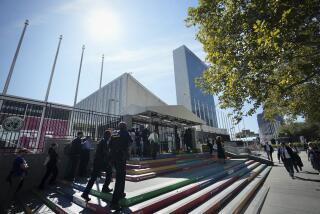Gorbachev Needs a Productive Summit
- Share via
Moscow’s reaction to the U.S. air attack on Libya has had many in the West wondering about the fate of the Reagan-Gorbachev summit.
Yet Mikhail S. Gorbachev has much less room to maneuver than is commonly realized. Despite his energetic efforts to create momentum for his domestic and foreign policies he has made little headway. Discussions about the summit and its agenda are the main reason the Soviet leader still is making headlines in the non-communist world. He needs that summit badly, but at the same time he is rather poorly positioned to achieve the necessary concrete results from it--especially on disarmament.
With his dynamic, reformist address in February at the 27th Communist Party Congress in Moscow short on specifics, Gorbachev had the world eagerly awaiting his speech to the East German Communist Party Congress last month. While his reformist intentions remained convincing, his speech did not meet expectations. Althoug his criticism sounded somewhat more cautious than in Moscow, the delineation of how he wants to lead his nation and his communist allies remained uncertain.
There is a reason for his approach. As Gorbachev noted in his East Berlin speech: “We are sometimes asked, ‘Haven’t we gone too far in our criticism, aren’t we thus giving food for anti-communist propaganda?’ ” In Soviet jargon that is as good as flatly declaring his approach is openly challenged at home. Nor are the economic obstacles he faces getting any simpler. While most countries are better off economically than at any time during this decade, the Soviet Union has suffered a sharp reversal.
This complex situation at home complicates Gorbachev’s foreign-policy options as well. This is quite apparent in Eastern Europe, for example, which basically continues its old policies regardless of the sharply different tone in Moscow. Some of Gorbachev’s foreign-policy pressures, especially in U.S. and Western European relations, are of his own making. By replacing the veteran Soviet Foreign Minister Andrei A. Gromyko with Eduard A. Shevardnadze, Gorbachev opened the door for his new foreign-policy drive. At the same time, however, it was expected that such a radical move would soon be justified by results.
Thus far, however, his intentions have not been translated into reality. Neither Gorbachev’s courting of France on disarmament and other issues during his visit last year, nor Shevardnadze’s trip to improve relations with Japan, resulted in a much-needed spectacular foreign-policy breakthrough. Soviet relations with Peking appeared to be developing somewhat more positively. But when Peking declined Moscow’s recent proposal for a Soviet-China summit, it revealed to the world that even that relationship is not without obstacles.
These and other developments quickly brought it home to Gorbachev that the only important avenue left open to him is a second summit with President Reagan. With the last meeting in Geneva short on concrete results, Gorbachev has to prove to his more hard-line colleagues in Moscow that he will press for something more substantial. He probably hoped his new disarmament proposals would bring him closer to that goal.
But it was not to be. The Reagan Administration has continued to keep the Soviet leader at a distance: The United States has dispatched its warships into Soviet waters and ordered the Soviets to reduce their personnel at U.N. missions, and reportedly plans to supply Stinger anti-aircraft missiles to Afghan rebels. Gorbachev has obviously been irritated by these moves but could do little about it.
Under these circumstances the U.S. air attack on Libya was not without some positive aspects for him. The tensions it produced in Washington’s relations with Western Europe and most of the Arab world seemed to open new opportunities for Moscow.
In his East Berlin speech, just four days after the Libya bombing, Gorbachev showed his eagerness to exploit the situation by proposing what he called a “new initiative” for NATO and Warsaw Pact countries to reduce their conventional forces substantially “from the Atlantic to the Urals.” Clearly, Moscow regarded the cancellation of the planned meeting between Secretary of State George P. Shultz and Shevardnadze as a small price to pay in order to pursue this new option with Western Europe and other countries displeased by the U.S. attack.
Yet Washington is still in the driver’s seat. Even in the best of circumstances it would take Moscow months, if not years, to make a substantial foreign-policy breakthrough in Western Europe, Japan and the Middle East--and the Administration still has greater opportunities there for out-maneuvering the Kremlin. And the way in which the Soviets handled information about the Chernobyl disaster will not help them improve credibility abroad.
Gorbachev needs some concrete achievements soon. Provided the Reagan Administration does not make costly mistakes, it is only a matter of time before the Soviet leader will resume his drive for the more productive summit.
More to Read
Sign up for Essential California
The most important California stories and recommendations in your inbox every morning.
You may occasionally receive promotional content from the Los Angeles Times.













